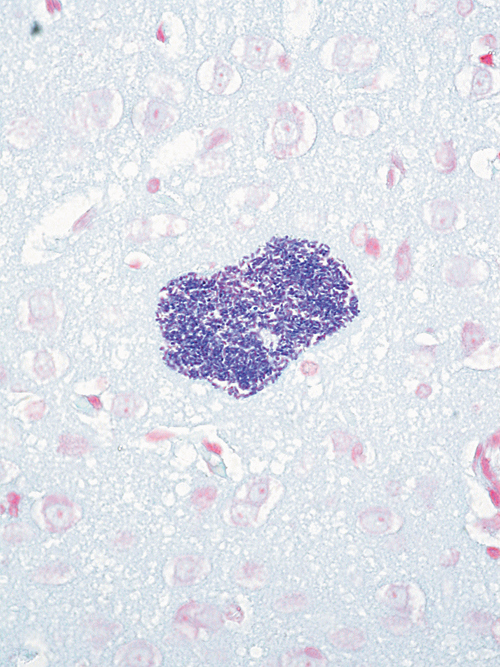Difference between revisions of "Rabbit Medicine and Surgery Q&A 11"
Jump to navigation
Jump to search
Ggaitskell (talk | contribs) (Created page with "{{Template:Manson Keeble Meredith}} centre|500px <br /> '''A gram-stained histological section from a rabbit’s cerebrum is shown. The animal...") |
|||
| Line 18: | Line 18: | ||
*The life cycle lasts 3–5 weeks. | *The life cycle lasts 3–5 weeks. | ||
*Rupture of the host cell causes inflammation and results in clinical signs in the host animal. | *Rupture of the host cell causes inflammation and results in clinical signs in the host animal. | ||
| − | |l1= | + | |l1=Encephalitozoon cuniculi – Rabbit |
|q2=How is this disease transmitted? | |q2=How is this disease transmitted? | ||
|a2= | |a2= | ||
| Line 24: | Line 24: | ||
*In pet rabbits the most likely route of infection is via ingestion of spores from urine-contaminated food and water. | *In pet rabbits the most likely route of infection is via ingestion of spores from urine-contaminated food and water. | ||
*Transplacental infection and infection via the respiratory route following inhalation have also been reported. | *Transplacental infection and infection via the respiratory route following inhalation have also been reported. | ||
| − | |l2= | + | |l2=Encephalitozoon cuniculi – Rabbit#Transmission of Encephalitozoon cuniculi |
</FlashCard> | </FlashCard> | ||
Revision as of 10:02, 11 August 2011
| This question was provided by Manson Publishing as part of the OVAL Project. See more Rabbit Medicine and Surgery questions |
A gram-stained histological section from a rabbit’s cerebrum is shown. The animal presented with severe head tilt and was collapsed. It was euthanased.
| Question | Answer | Article | |
| What is your diagnosis? | Encephalitozoonosis.
|
Link to Article | |
| How is this disease transmitted? |
|
Link to Article | |
